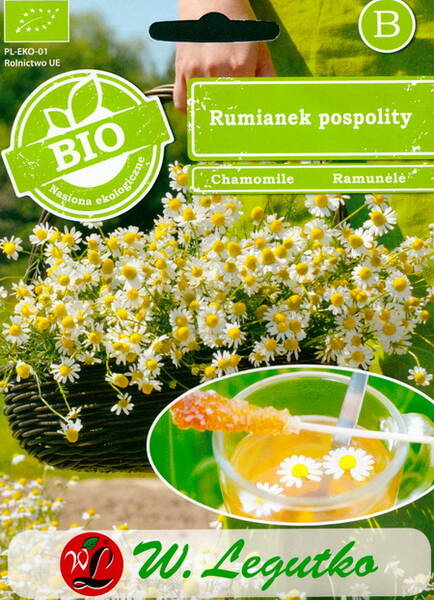Pharmacy chamomile is an annual herb with a strong specific odor. The stem is erect, 15 to 60 cm high, usually branched from the base, less often simple, ribbed-furrowed, hollow inside, leafy to the top.
Chamomile is one of the most commonly used herbs in medicine. Chamomile inflorescences are used as medicinal raw materials.
Chamomile contains more than 40 components of natural compounds that provide a therapeutic effect. The flowers contain acids (ascorbic, nicotinic, salicylic), bitterness, choline, chamazulene, bisabolol, tannins, glycerides of fatty acids, sugar, dioxicoumarin, umbelliferone glycoside, mucus and pectins.
Also, chamomile oil contains herniarin, apiin, apigenin, which play the role of natural antispasmodics. They contribute to the expansion of blood vessels, including the brain, and weaken inflammatory processes. Flowers contain almost all vitamins necessary for a person, accumulate more than 15 macro- and microelements, including vanadium, selenium, nickel, zinc, cobalt, chromium, copper, iron, magnesium and other elements necessary for the body.
Germination of chamomile seeds begins at +4+6 °C, the optimum germination temperature is +15+20 °C, germination occurs at a higher temperature (up to +30 °C). Seeds remain viable when stored dry in room conditions for a long time. Chamomile is propagated exclusively by seeds.

Sweet False Chamomile, Matricaria, Mayweed. Bot. syn.: Chamomilla chamomilla, Matricaria chamomilla L., Matricaria chamomilla var. coronata, Matricaria suaveolens L.
Pharmacy chamomile has the following effects:
• quickly relieves various inflammatory processes, including gastrointestinal diseases;
• a powerful natural antiseptic used for viral and microbial damage to internal organs, skin (dermatitis), treatment of purulent wounds, boils and other diseases;
• a good therapeutic agent for tonsillitis, acute respiratory infections, acute respiratory viral infections, flu and other colds;
• mild soothing for restless superficial sleep, insomnia, stressful situations, nervous tension;
• used as an analgesic for neurological pain, stomatitis, glossitis, laryngitis, pharyngitis, toothache;
• enhances regenerative processes in a weakened body after surgery;
• the systematic use of teas enhances the immune system;
• lowers body temperature (diaphoretic), soothes and relieves pain;
• has good restorative properties for gastrointestinal diseases;
• excellent adsorbent for poisoning.












